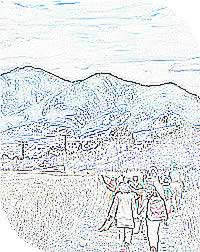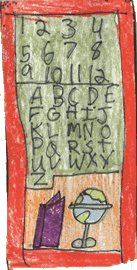Educational Portfolio for Spencer Olmsted
Contact Information
Spencer Olmsted513 Central St NE
Olympia, WA 98506
(solmsted at yahoo)
2009-Current: 5th grade math and science teacher at Pioneer Elementary School in Olympia, Washington.
2006-2009: 5th grade teacher at L.P. Brown in Olympia.
Fall 2005: student taught in the 4th grade at Morning Star Elementary School in Bozeman, Montana.
Education
Links place content further down the page.Blog Entries
Graduate Work

Field trip to the Tinsley House at the Museum of the Rockies
Philosophy of Education
It's no secret that engaged students learn more, make deeper connections, and have more fun in school. From the first day at school my students learn about Maslow's Hierarchy of Needs, and Kohlberg's Stages of Moral Development. We learn about the brain, neuronal networks, and what it is that we are building as we learn new things. We spend time learning about one another in order to become a community. We talk about our cultures and our heroes and what makes them special. I use accessible language to hit on some complex material, but this is where we need to start. Those first few days are very exciting, and it is my goal to set up a framework for individual development within a socially conscious classroom.

Over the course of the next few months we return often to personal needs and internal codes of behavior, but more than that we get to know each other. This relationship will inform me about their individual learning styles, aptitudes, and interests, and it will allow them to make a personal connection with me. This magnifies my ability to connect with them during instruction.
I am a life-long learner, and am comfortable with new material. I love to solve problems and discuss different perspectives, and I don't have a problem telling students when I'm wrong. I work hard to develop these skills in my students. I don't want my students to feel as though they don't know enough to think about and solve complex problems; I want them to be able to apply what they already know in new situations. The ways of thinking we develop in elementary school can be used and applied throughout our entire lives.
One of the most powerful ways of learning something new comes as we face inaccurate or incomplete conceptual models within ourselves. Everyone forms conceptual models of how they think the world works, and by closer examination we can put those models to the test. Although topics such as the phases of the moon, concepts of light and color, and electricity are all well understood by scientists, the general public often holds on to inaccurate conceptual models. Each of these topics is so readily observable that the uninitiated have constructed their own ideas for how each functions. Students must be allowed to face their misconceptions and given time to consciously deconstruct and rebuild a framework for understanding.
I want my students to succeed, and for that to happen they need to be addressed as whole people, listened to, and hopefully understood. I work with them to develop an environment of trust and equity, in which amazing things can happen.